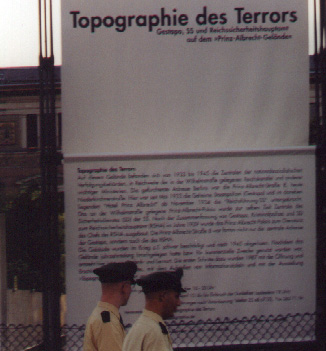| 1945: | The formative year. |
"Those who forget the past are doomed to repeat it."
| When | What | meaning |
| January | Battle of the Bulge, Belgium. | Allies
stalled in France |
| February | Russian advance on Prussia & Berlin. | Soviet
bombardment began |
| March | Yalta Conference; meeting of the Big Three: | Roosevelt,
Stalin, & Churchill |
| April | Roosevelt's death, Truman is President. | Concentration
camps liberated |
| May | German surrender: May 7th. | Okinawa
captured by US from Japan |
| June | Potsdam Conference & ultimatum to Japan. | Japanese
"Peace Cabinet" in power |
| July | Alamagordo test of the Atomic Bomb, 7-16 | Molotov
approached by Japan for peace |
| August | 6th, Hiroshima bombed, 9th, Nagasaki bombed. | Russians
invade Manchuria as agreed |
| September | Japanese ceremonial signing of peace. | Cold
War begins between the US & USSR |
There is no more critical year in world history than the events of 1945, because these events had a lasting influence on diplomacy, war and resources. The tragedy of 1945 froze the world into a geopolitical shape, set the course of the US on a road to restore European empires to their postwar status in order to out maneuver the Soviet Union, and unleashed a terrible new prospect of nuclear armaments for the world's strongest powers.
The tragic quality of what transpired arose from a confluence of five events. These included the fog of war, the untimely death of Franklin Roosevelt before the war was over, the fraying diplomatic ties among the Allies, and the annihilation of millions of civilians for no other purpose than to break the morale of the Axis nations of Germany, Italy and Japan. Stubborn resistance, miscommunication, misjudgments and poor timing all contributed to the abysmal conditions into which technicians and scientists delivered a totally new sort of weapon. The atomic bomb fueled by nuclear fire was developed by the United States in competition with the Nazis in Germany. Nothing could have prepared the leaders for what happened and the world, far from being a safer place after the war with the founding of the United Nations, became instead a nuclear armed arsenal. The war alone is believed to have cost 35 million lives, not counting the 12 to 15 million who died in Fascist extermination camps.
 Today, despite the end of
hostilities with Soviet Union and its allies, the United States, Britain, France,
Russia, Israel, Pakistan, India and China possess more that 50,000 nuclear armed
missiles capable of obliterating life on earth because any score of weapons
if exploded would devastate the world's leading nations. Tactically useless,
these strategic, hydrogen weapons are the ultimate defense against an invader,
because of the character of the missiles, when detonated, to indiscriminately
dose both invaders and defenders with lethal radiation.
Today, despite the end of
hostilities with Soviet Union and its allies, the United States, Britain, France,
Russia, Israel, Pakistan, India and China possess more that 50,000 nuclear armed
missiles capable of obliterating life on earth because any score of weapons
if exploded would devastate the world's leading nations. Tactically useless,
these strategic, hydrogen weapons are the ultimate defense against an invader,
because of the character of the missiles, when detonated, to indiscriminately
dose both invaders and defenders with lethal radiation.
The photgraph here to the left is of a memorial in Berlin Germany to the wall that once divided Russuian from Western interests in thecapital of Germany, due in large part to the cold war. The peace of 1945 and the use of the Atomic Bombs on Japan by a new and relatively inexperienced American administration, contributed to quite a large degree, to the undermining of US-Soviet relations.
The cold war is actually the story of how the US and the Soviet Union having been allies from 1941 until 1945 broke into antagonistic rivalry. The legacy of the cold war includes the thousands of nuclear weapons now possessed by more than a dozen nations around the world. What began as mistrust in late 1944 grew to suspicion and intrigue as Russuian armies advanced into Germany from the west in 1944 and 1945. By 1950 the seriousness of US - Soviet rivalry erupted into a War in Korea that would spread to Southeast Asia, Africa, Cuba and Yugoslavia, before the collapse of the USSR in 1989.
The use of the fission bomb in 1945 is just one of a handful of technical decisions that have had a lasting impact on the character of our world. Among the many inventions the Second World War produced, computers, radar, DDT, jet engines, are inventions that have changed our lives and the world we inhabit.